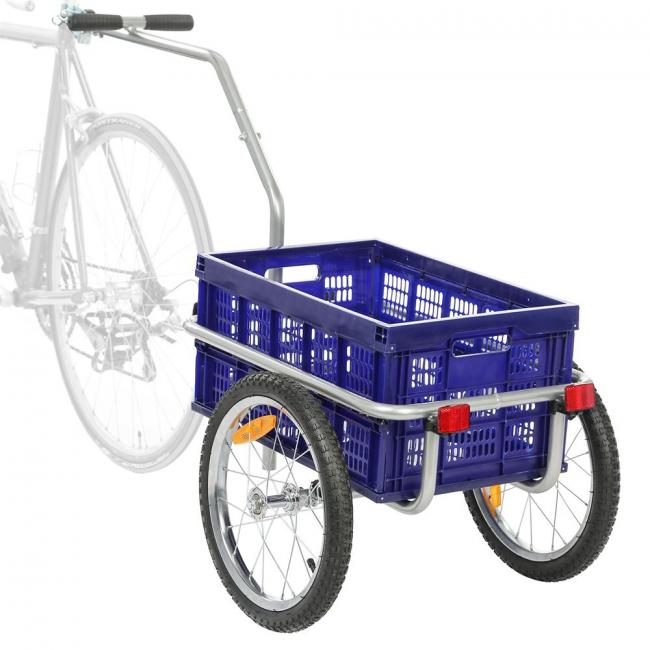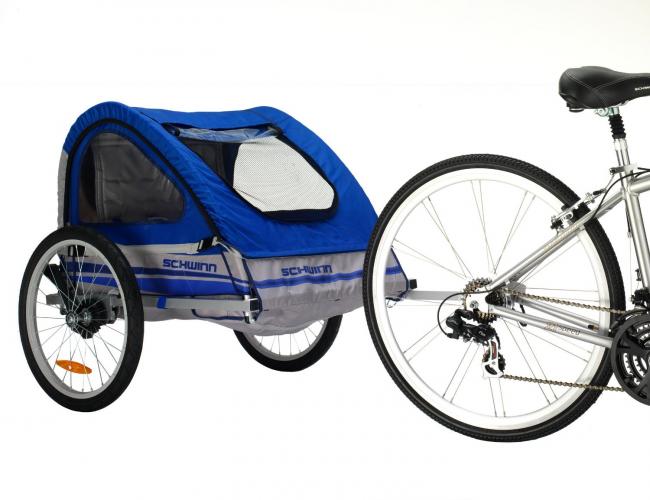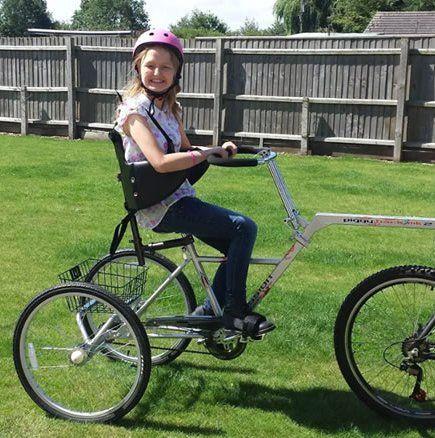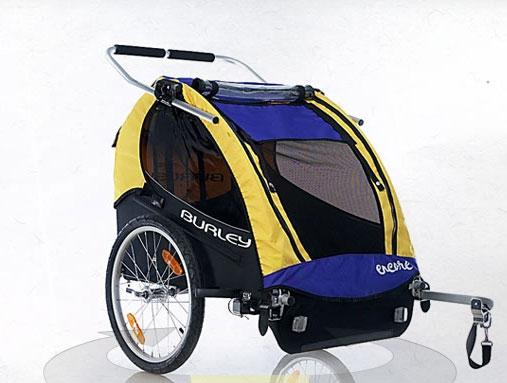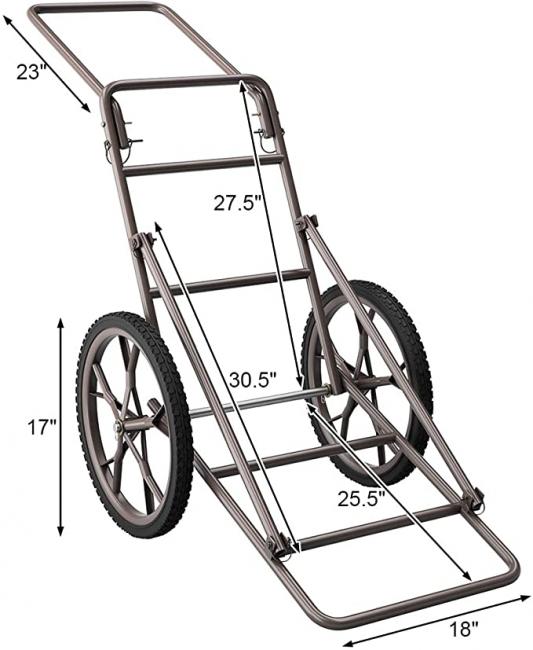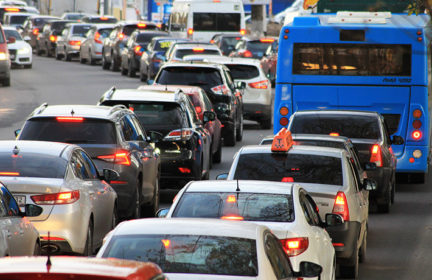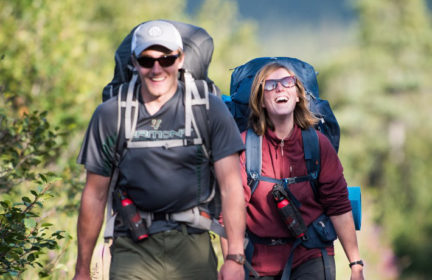Preps for people with physical disabilities and limitations or who aren’t in great physical shape
I’d like to start a thread where we can discuss how to best get prepared if you or a loved one is dealing with physical disabilities or limitations or isn’t in the best physical shape. I’m particularly interested in discussing scenarios where we have to bug out. I know it’s desirable that person be in good shape for physically strenuous activity in case of the need to evacuate, but let’s get real. Some people just aren’t. Life happens; age happens; disability happens. We all do our best. I see physical fitness as an important goal to have in mind for health and safety reasons, but not something we should feel bad about falling short of.
I have very personal reasons for starting this thread. I am in my 50s, not in great fitness shape, although not horrible. I have some repetitive usage disabilities and long standing foot problems and now some knee problems. Nothing extreme, but I’m pretty keenly aware that hiking out of Dodge with 25 or 30 lbs on my back would wear me out pretty darned fast. Honestly, I don’t know if I’d even make it a mile on foot. I also have a mother who is much MORE disabled, living part time alone after having a stroke two years ago.
I want to be practical so am looking for ideas of what I can do at my current size and shape and fitness level to prepare.
-
Comments (61)
-
Seasons4 - December 21, 2020
Good topic. I live in a climate with harsh winters, and I’m in my 60’s. I’m hoping to avoid bugging out on foot, though I’ve prioritized fitness and have even enjoyed exercise classes on Zoom. I hope to use wheels to maximum advantage — a vehicle where possible, a collapsible wagon (steel frame, nylon bottom and sides) where possible, to hold multiple small bags rather than one big bag (easier on the joints and back).
I have disabled family members living together nearby. Except for a wildfire, I think they will have to stay there while I leave, if I have to leave. I have identified friends or acquaintances roughly every 5 to 15 miles away in the direction I would evacuate. They would be my intermediate destinations.
I live on a peninsula, so there is one general direction to travel. I am not imagining that I would ever need to travel more than 50 miles away from where I’m living. I want to learn as much as I can about resources, bottlenecks, etc. within a 50-mile radius.
-
Jonnie PekelnyContributor - December 21, 2020
Tell me about your collapsible wagon…?
-
Seasons4 - December 21, 2020
Here are some collapsible wagons available at Target:
https://www.target.com/b/mac-sports/-/N-5o67i
I wanted a collapsible one because it folds into a smaller space (one set of wheels nests inside the other set of wheels). Also, I had to carry it up and down stairs. I usually keep camping gear in it. I can have it in my car, if I want to..
-
-
Bob - December 21, 2020
All the 3 mentioned aspects apply to me.
Had mentioned somewhere here at TP.com that I don’t depend on a multi tool (although I have a couple) because my preexisting hand injuries (military service) frequently preclude me opening them. Solution is a small/lightweight sheath knife with needed type of blade and chisel tip. A walking staff / pole of some sort is a requirement.
Seasons 4 mentioned a wagon for personal cargo. Yes !
The planning is clear enough; more efforts to shelter in place than an “infantry” evacuation. Going out on FLC – “Feet-Leater-Covered” – is an absolute last choice. The emergency management principle is “Go to safety and not away from danger”. Who the heck knows ? The trails and roads can be more dangerous than the peril that devastates the home.
Still, there are gadgets that can help regardless of what plan gets exercised. Those with disabilities could consider a locator transponder (costly and not always working depending on the situation), more than 1 whistle, a signaling mirror, a strobe light. Foxx whistle company makes a battery (9V) powered “whistle … something like a mini megaphone’s fog horn feature. Something to check on.
There are some great publications re emergency preparedness and the disabled. When I can get to them, will try to post.
-
Bob - December 21, 2020
Jonnie, for background information and familiarity … the broad picture … take a glance at:
Center for Disability Issues and the Health Professions. They’re part of Western University of Health Services, Pomona, California : http://www.cdihp.org
I haven’t looked at above link in years so bear with me. Hopefully something appears to start some surfing around.
Can’t get to my disabled pubs now; boxes of hurricane supplies blocking access to specific section of bookshelf.
Much of this stuff not appropriate to learn from the web. Consider joining a prep group. There’s an abbreviation in the business world that frequently proves to be valuable: “M.B.W.A.” It stands for Management By Wandering Around”. Consider going to some nearby big stores like Target the big home improvement stores and check out the garden wagons and others.
I’m a life member of Disabled American Veterans (“DAV”) and know of many members who defeat their disabilities and are well prepared. They thought out their situation and prepared accordingly.
Related to all this, if you knew the internal dynamics of the involved Federal agencies, like DHS, VA, FEMA, HHS, OFDA, … how do you say “scary” auf English ?!
-
Jonnie PekelnyContributor - December 21, 2020
Thanks for the link, Bob. But it’s the wrong time to go to Target and stores in general, pandemically speaking!
-
Bob - December 21, 2020
There are “shoppers” in various local orgs. Sometimes … I’d say often … browsing the stores in person by a colleague shopper yields better bang for the buck than cyber purchasing.
I’m disabled but still mobile. In a local vet organization (not DAV), was asked if I could help out wife of someone who just went to sea on USN boat. Loaded several bags of salt in their well house. The objective is to help the overall effort. This is a benefit of local community involvement.
Understand avoiding stores in current environment. I’m just selective as to which stores I go to and it must be immediately when they open and no longer in store than max 15 minutes.
-
A2 - December 27, 2020
Just an FYI: I got covid (then 8+ months of long-covid) from a 15-minute very early morning Costco run.
I was wearing a half-face respirator with P100 filters and snowboarding goggles. There were unmasked, coughers, sneezers. I tried mightily to keep my distance, but covid’s aerosols love inside air.
Possibly got it when taking off my PPE? Possibly just because nothing is 100% safe? Regardless, I got it and now have partially-collapsed lungs…which REALLY impacts my ability to bug out any time soon.
You might be selective, but covid sure as hell isn’t. Please be safe; this virus has overturned my life.
-
Dog lover - December 27, 2020
Really sorry you had such bad complications with the virus. It really is a genetic crapshoot for how badly anyone is affected. I’ve known of a few that had terrible preexisting conditions and they breezed through it. I’m talking smoking, cold, overweight and age. It’s a good reminder for us all to be very careful.
-
A2 - December 27, 2020
Thanks for the kind words, Dog Lover. And yes, you’re right—it’s a genetic crapshoot, though there’s more and more research being done, which is great.
Bottom line—Don’t take ppe as a free pass, don’t make “just this once” exceptions to travel, distancing, indoor activities, or seeing other people. Don’t get “pandemic fatigue” and take risks.
Be. Very. Obsessively. Careful.
-
Dog lover - December 27, 2020
Wise words about being careful.
-
Jonnie PekelnyContributor - December 28, 2020
That sucks, A2. Particularly since you WERE being careful. I haven’t been shopping in person since March. I hope you recover sooner rather than later.
-
Gideon ParkerStaff - December 28, 2020
A2 – I’m sorry to hear that covid has hit you so hard. Especially because you were doing everything and even more than 90% of people do. It’s frustrating that people like you who try so hard to avoid it, get it.
Thank you for sharing your experience with us and for giving me more motivation to keeping myself safe and healthy.
-
Alicia - January 8, 2021
O. M. G. I am sorry as well that you contracted and then have had such a response to this nasty Covid virus. It’s even more heartbreaking given how careful you were, taking such precautions. I’m sure the Costco was an outbreak event given your level of PPE didn’t prevent infection. I am also very glad you are better and hope you continue to improve. Thanks for sharing your story.
-
A2 - January 19, 2021
Thanks for your kind words, Alicia 🙂
-
Bob - December 21, 2020
https://www.cdc.gov/ncbddd/disabilityandhealth/emergencypreparedness.html
Here’s another link with much material to surf around for what can help situation’s planning. Look at the local community resources section.
-
-
Gideon ParkerStaff - December 21, 2020
I personally am paralyzed from the waist down and am in a wheelchair. Prepping sure has a different meaning for me than it used to.
My advice to all with physical limitations and/or disabilities is to know your limits. Go out and test how far you can walk, how much weight you can carry, and what you can do. This will prevent you from doing something stupid that will cost you your life. For example, if things start to go bad in your neighborhood and you leave your house to go bug out to the mountains, but can’t walk more than 1/4 mile and now you are stuck somewhere, can’t get back, and are in an even worse scenario.
For most people, bunkering down is the safest and best course of action. All your preps are there, you have good shelter, etc… The physically limited and disabled will have to be able to hold up a bit longer than others as bugging out really is not a good plan for most of us, because we just can’t do it.
But things happen and change where we may be forced to evacuate even if we had full intentions of sheltering in place. A fire, hurricane, earthquake, and more can cause even the most prepared to have to leave. So go back to your prepping basics and figure out a solution. Say to yourself “I’d love to stay here as long as possible, but it may be necessary to bug out someday, how am I going to do it?”
Some ideas would be to have a good reliable car, having a cart of some kind to help put your stuff in, something like the monowalker, maybe even a golf cart kind of thing could be an option.
Living with physical limitations and disabilities is already hard enough day to day, but prepping while you have these limitations is even harder. We need to prep more than the average person, can’t do things that normal people can do, and it is just overall tougher physically and mentally. We need to improvise, adapt, and overcome more than the average person. I admire those who realize they have something holding them back but say to themselves that they don’t want those things to hold them back, and prepare and plan on ways to overcome those problems and issues.
-
Jonnie PekelnyContributor - December 21, 2020
Yup! I live in wildfire and earthquake country. (And by live in I mean my general area. I personally live in the city, but Northern California has certainly been subject to a lot of wildfires lately, and earthquakes are endemic here). Having to evacuate is a very real possibility for us now and, if we actually have to flee from an aggressive fire we might have to abandon our cars. It happened in Paradise, CA a couple of years ago. So, yeah, staying put would be my choice too, but it may not be a choice.
-
Gideon ParkerStaff - December 23, 2020
One idea if someone is not able to walk long distances, is to maybe have a bicycle, moped, or dirt bike. In another forum thread about making cycling part of your prepping, people are sharing some good ideas on there about bugging out with their bike.
Biking is much easier on the knees, you can go further much faster, and maybe adding a small cart or a baby carrier behind could be a way that you could carry a small dog or some gear.
-
Watermelon Samurai - January 29, 2021
FWIW, I just assembled one of these bicycle trailers for my neighbor with a special needs child:
The trailer was very well designed and strongly built. The mother rides with her son: she has an average fitness level and is slightly smaller than average, but has no problem pulling the trailer or controlling the bike.
Since the child is helping to pedal, it occurred to me that this kind of setup might be helpful to families that need to use a bicycle in an evacuation plan. The basket is also larger than it appears in the photo, and it could be easily replaced with something larger.
-
Bob - January 30, 2021
A great post and picture; Thank you.
Just told someone about this bicycle trailer. It will help her and child.
…… I note that the trailer’s basket can hold a small watermelon !
-
Dog lover - December 25, 2020
No doubt prepping involves taking a realistic look at your situation and making the best use of whatever resources you have available. Just being honest about your limitations and considering what other options you can use to offset them allready helps you out more than the average person with no plan.
-
-
AT - December 21, 2020
I’m a fellow NorCal-er and agree that in the north state, wildfires need to be on everyone’s radar, no matter where you are. Paradise, Santa Rosa, Napa and others. The recent fires in Oregon between Ashland and Medford were scary because that’s not an area that should burn. My area has seen two large-scale evacuations in the last several years (Camp fire and the Oroville Dam debacle). Books could be written about the lessons learned, but I wanted to mention a few things I’ve learned that may be relevant.
We’ve learned that you can’t wait for an official evacuation notice. It’s time to get in the car if things don’t look right, especially if mobility is an issue. The authorities are doing their best to get the word out, but some of these events are so explosive that no one really knows the extent of it for hours. On the radio you basically just hear units reporting “I’m at X and it’s all on fire. Trying to get people out but we don’t know where to go.” The texting systems take time to get the messages out while network traffic is through the roof with everyone else trying to figure out what is going on.
In the Camp fire, local EMS agencies did heroic things getting people out, but they couldn’t get to everyone. To help the process, if your mom would need special assistance to evacuate, you might ask your EMS dispatch center to add a note to the address that she would be unable to evac alone. The next fallback if you weren’t around would be to have neighbors you can rely on to help her out. There were so many stories about people checking on their neighbors, getting them in a vehicle, and driving them down to safety. People helping each other out is a big reason the death toll wasn’t higher.
Maybe that’s helpful. Not sure if those are “preps,” but there’s only so much you can do if you happen to be downwind of the fires we’ve had the last few years.
-
Jonnie PekelnyContributor - December 22, 2020
Good tip, Andrew, as far as early evacuation goes. My mom does have very helpful neighbors but she has a heck of a time asking for help. I live about 25 miles away and in covid times it’s been particularly challenging for me to be of help directly to her because we’re not in the same covid bubble.
-
Gideon ParkerStaff - December 23, 2020
I have called my local emergency response center and let them know about my wheelchair and physical limitations. They put a note on my address and first responders will see that if they are going through and doing search and rescue.
-
-
Jonnie PekelnyContributor - December 28, 2020
On the subject of being prepared, I am underwhelmed by TP’s page on fitness for preppers (https://theprepared.com/prepping-basics/guides/survival-fitness/). My biggest gripe about it is that, while it pays some lip service of being for everyone, it really seems customized for people who are young, have no physical limitations, joint problems, or whatever and who just happen to be out of shape.
Also the advice on losing weight is outdated and simplistic. The fact is that it’s NOT a matter of calories in minus calories out. The body uses energy in a much more nuanced and complex way. AND it has powerful, built-in mechanisms to make sure you don’t starve, so losing weight by depriving yourself of calories almost always backfires and causes you to gain more weight than you lost later.
It seems to me that we need realistic ideas for improving physical fitness for seniors, people with physical disabilities and others in a similar boat. Yeah, it would be great if I could complete all these tasks that this page uses to measure prepping survival, but that’s not a realistic goal for me right now. So, it’s important to have a plan B.
-
Gideon ParkerStaff - December 28, 2020
I agree that the majority of the 2nd half of the article, where it talks about different workouts and exercises, is not applicable to me (because I can’t do them because I don’t have the use of my legs being in a wheelchair) I did find a lot of valuable information in the first half of the article.
While we are all at different fitness and capability levels, I think that everyone can learn many things from this article. We need to pick and choose what is the best approach for us in all areas and levels of preparedness. For example, we may read an article about ham radio and although we might not have the time to dive full into the world of ham radio, we can pick up other ideas and concepts like improving our emergency communications in our preps.
Some things in this article that I think can apply to everyone are:
- Fitness improves your life today, reduces your risk of emergencies, and improves your chance of surviving an emergency.
- There are free, basic, and practical things that everyone can start doing today to improve their health and fitness.
- Physical fitness impacts mental health
- Being healthier reduces chances of injuries
- Exercise can get your body used to stress in a healthy way so that you can handle it better in an emergency
- And there are lots more…
I do think that this article needs at least a paragraph if not more about fitness with disabilities, limitations, and age. But just with all limitations, we have to learn how to adapt and apply it to ourselves. For example: I’ve gone on YouTube and have looked up exercises for people in wheelchairs.
Even though I have a disability, I am a firm believer in still doing exercise in a modified fashion. (Though I am stupid and don’t do it as much as I should.) When I exercise regularly, I have less pain, feel stronger, have more energy, have more self esteem, and feel like I can do more. To quote the article: “Find what works for you. The most important thing is to just get moving!”
-
A2 - December 28, 2020
Totally agree, Gideon! Personal example: I have long-covid, which manifests (for me) as profound exhaustion and shortness of breath. Get dizzy/faint from even taking a shower. So I bought a stationary recumbent bike and pedal a mile a day. That’s only five minutes, which sounds absurd, but with partially collapsed lungs it’s a win.
I could make lists of all the hiking, biking, swimming, surfing, horseback riding I used to do, but that’s a fool’s errand. Instead, I do what I can, when I can, and practice gratitude that I’m even here.
”Just keep moving.”
-
Gideon ParkerStaff - December 28, 2020
Just like in any emergency or preparedness scenario, if your house gets taken out by a tornado, you sprain an ankle climbing a mountain, or your down sleeping bag gets wet, as survivalists we need to just roll with the punches and keep moving on with what we are given.
This is one of my favorite and motivating pictures. Whenever i’m having a hard time, or thinking about my prepping I think of this picture.
I wanna be tough like Bear Grylls and survive anything!
So yes A2! Even 5 minutes on a bike is a win, because when others would just sit in bed all day, you are getting out there and doing the best you can!
-
Bob - December 28, 2020
I read Dr C’s document when I first started surfing around TP.com. It’s good-quality material for preppers.
It starts with diet and provides examples. The mentioned vitamin D mirrors what I was told by my private MD and 2 VA Medical Centers.
Reread the document and you’ll see “There’s no special formula … other than focus on your … strength, endurance and mobility”. Readers here must tailor aforesaid to their specifics.
I am partly disabled – minor ophthalmological /optical matters and hand injuries never fully healed from military service – so, for example, I adjust my driving of pickup and inflatable as situation dictates. This is one reason my posts here frequently might seem incoherent. An emergency evac might be cancelled if alone.
It must be understood and accepted that websites do not replace “community”. In-person meetings are the best. There are many here and much more in California. I’ve attended major city FEMA meetings and some of the best contributors were blind.
-
Gideon ParkerStaff - December 28, 2020
Wow! That sure would be inspiring to see a blind person at a FEMA meeting. That is one disability I would have an extremely hard time with and I greatly admire and respect those going through that challenge.
-
Bob - December 28, 2020
https://www.fema.gov/about/offices/disability
About 15 years ago FEMA established an Office of Disability.
I’ve worked with the blind – A+ in radio room, telephone bank – the wheelchair bound and … forgot term … all of a sudden they stop everything as if “spaced out”. Now believed caused by lack of O2 reaching brain.
An attendant for the blind is needed of course but attendants are needed for many others and the quality and hours of work are not a function of the disability; typically just the person’s ideological intensity concerning the response.
Re above link, … at several conferences I met with FEMA’s first Disability Coordinator.
-
Bob - December 29, 2020
Eureka: “I have found it”.
Just spend nearly 4 hours looking for something and found it. I promised myself to never again clean up / reorganize this place.
Here are the 5 factors that contribute to premature death:
1. Behavior: 40% (tobacco, obesity, diabetics, other preventive diseases)
2. Genetics: 30%
3. Social circumstances: 15% (eg poverty rates)
4. Health care: 10%
5. Environmental exposures: 5%
………………
Genetics can’t be controlled but like some members of my veterans organizations I attend (until pandemic restrictions), it will help one’s health if changing diet from breakfast being 2 strawberry pot tarts dropped in toaster and a 6-pack.
-
Olly Wright - December 29, 2020
Thanks for taking the time to look that up and share it! I agree that good exercise, habits, and nutrition can greatly improve the quality and length of our life.
Too bad that genetics can’t be changed as easily as doing some extra pushups though.
-
-
Dog lover - December 28, 2020
After considering being blind, in a wheel chair, or having a collapsed lung I’m feeling pretty good about my personal physical condition. My spine has a good amount of wear so I can’t push like I have most of my life. Even without any thing as major as mentioned I am aware of the limits I have physically and just have to overcome as much as possible with improvisation and tools. We do the best with what we have for as long as we can. Sometimes in life that’s the best you can do.
-
Jonnie PekelnyContributor - December 29, 2020
I have a couple of questions for the folks who use the foldable carts as part of their bug out plan. First question — do the carts have to be pulled or can they be pushed? And does the handle lock in any way? Because in some of the videos I saw the handle looks like it turns every which way, which doesn’t seem very stable for pushing.
Okay, that was two questions already, so I guess I have three. I’m wondering if any of you are planning to bug out with pets AND with a cart. I have a smallish (22 lb) very agile and squirmy dog. She has no discipline on leash and when she’s freaked out she does amazing acrobatics to get out of a situation.
If I’m walking with a backpack, which I assumed I’d have to be, then I can lead her on her leash with fairly little problem. I’m used to that when taking her on her walks. But now that I’m rethinking the whole walking with a backpack thing and thinking along the lines of getting a cart, I can’t really imagine pushing a cart and wrangling my dog on leash. I could put her in a backpack thing on my back, which she would absolutely hate, but also that would defeat the purpose of not carrying a backpack. I could put her in a carrier and put the carrier in the cart, but then I wonder where I would stash my BOB and any other gear I might grab…
-
Gideon ParkerStaff - December 29, 2020
I think you are correct about the carts being pull only. I’ve tried to push wagons like that with the handle and it is just as squirrelly as your dog on a leash.
I would maybe look into a burley cart.
You can pull it behind a bike, attach a rope or something to a harness or waist strap and pull it by foot, or it even has handles to push it. You unfasten the plastic rain cover (see it rolled up on top) to protect your stuff inside, it will have enough room for your BOB and dog, and it is incognito. You’ll just look like concerned parent pushing your kid to safety, but secretly inside is your BOB guarded by a vicious attack dog.
-
Jonnie PekelnyContributor - December 30, 2020
An interesting (and expensive!) option, Gideon! Which Burley model is that? How are you thinking that the BOB and the dog would both go in? Would the dog be in a carrier? I can’t tell how much room is in the Burley.
-
Gideon ParkerStaff - December 30, 2020
My wife wants to get a burley cart to pull our kid around in when we have one, but I told her that she needs to keep an eye out on Craigslist because a new one is very expensive.
They have various sizes and I’m not familiar with models, but I believe the one I showed you is one that can fit two toddlers side by side. May be similar to this one. So depending on your BOB size, you may be able to fit that and a carrier in with it. But you would definitely have much more room without a carrier. I would just tie your dog’s leash to the included baby seatbelt in there to prevent it from escaping.
They do have burley carts that are much smaller and meant for just a single dog. But doesn’t look like you could fit your BOB or have the hand pushing option with this model.
I would maybe join a local facebook group for new parents and see if there are any parents that have one they could sell or give to you. I’m sure there is someone out there who’s kid grew out of it or they just don’t use it as much as they used to.
-
A2 - December 30, 2020
I’ve also looked at folding game haulers because they’re built for tough terrain. I’d start with a crate for my Maine Coon and top that with my BOB, lying lengthwise on top of the crate, cover with a tarp, then bungee the whole thing. Fairly inexpensive, lightweight, built tough, folds up.
Could also use to haul an injured person in an emergency, or other heavy items (firewood, water containers, multiple BOBs, even game!)
https://smile.amazon.com/s?k=Game+hauler&ref=nb_sb_noss_2
-
Jonnie PekelnyContributor - December 31, 2020
Huh! I never knew such things existed! (But I’m not a hunter). To me the obvious downside though is that there are only two wheels. That might be fine for short distances, but if I’m hiking out of my city, supporting that weight will get tiring fast.
-
Bob - December 31, 2020
https://www.handtrucksrus.com/wagons.aspx#top
The marketplace has everything – There are 4 wheel versions of above. Also saw some similiar products for hauling light canoes,kayaks, duck boats.
At above link, on right side, glance at the on sale $109.95 # HTRUS-____ folding collapsible wagon. Looks like a better wagon than carried at the residential consumer big box stores. Plus, the cost is real good,especially with free shipping.
Below above cart picture is something I like, the field electric wagon – although don’t like electric products and have always been on the lookout for a gear/chain driven model (some have running boards on both sides). Move the vertical handle bar to and from and engaged gears propel the cart.
A main reason never got what I now need relates to other meaning of abbreviation “EM”. Besides “Emergency Management”, it also means “El Money”. This stuff, although can be well worth it, is relatively expensive.
-
Jonnie PekelnyContributor - December 31, 2020
Here’s another one that seems pretty nifty: https://www.amazon.com/dp/B013E08CKM?ref_=pe_623860_70668520_dpLink
-
Bob - December 30, 2020
Jonnie, I’m not replying to your 3 specific questions but rather having some disabilities. If researching a wagon, consider not needing to carry a back pack … although still using the pack for the stuff you need. It’s really not prudent to have a 23 lb dog in a cart (or even on a leash during these evac circumstances) and also carrying a back pack.
Just to generate some ideas …… of course the best you like will cost the most … same for me ! ……glance at the above link. About 7 rows down, to the left of the 2 children in a wheel barrel being pushed, is a blue foldable cart. Again, just generating ideas.
I don’t know what type of route your evac is on so can’t make specific comments. Consider contacting your local / area emergency management org and ask for any info. Who knows what will develop ? The EM folks might have specific requirements for those evacuating.
I will comment that if enroute conditions deteriate, some stuff like the espresso machine, loads of beans and coffee grinder might be sacrificed to the evac diety. Think about the overall load to include weight. You’re starting with 23 lbs of wuf wuf !
-
Jonnie PekelnyContributor - December 31, 2020
Just to be clear, I’m not thinking of carrying a backpack AND wheeling a cart. It’s going to be either one or the other. I do have my BOB in a backpack right now and I’m sure I’ll keep that. It’s a nice way to pack everything. But now I’m thinking that if I actually have to walk out that I’d like to have a cart into which to put the backpack…. and the dog I guess!
-
A2 - December 31, 2020
Even if I can get my lungs healed, I’m only walking five miles max, so all my preps are for a five mile radius of my house. That gets me to a fire station, a friends house, several churches, or a hospital. If I’m in my car, the calculations might change rather drastically, depending on where I am, and where I need to go, so my car bag has the ability to keep me dry and warm, watered and minimally fed, for several days on foot.
But right now I have partially collapsed lungs, post-covid, which means I could make it a few blocks before passing out. Not a great scenario. So fingers crossed that I can SIP or use a car if something happens right now.
-
Jonnie PekelnyContributor - December 31, 2020
Yeah, I hear ya. For us here in Northern California, the two biggest disasters are most likely to be wildfires or earthquakes. The wildfires have become a terrible problem and are only getting worse. In a wildfire situation, it’s entirely possible that we will have to abandon our cars and get out on foot. And, of course because we’re talking about a quickly moving fire, you can’t choose to stop at 5 miles.
This is an entirely realistic scenario. When friends question me about why we need to prepare to SIP for two weeks or bug out, possibly on foot, I remind them about what happened in Paradise, CA, which is about a three hour drive from where I live. There was a terrible wildfire there about three years ago, which destroyed the town. When it happened, there was a mass evacuation, but because of that there were traffic jams and the fire was moving quickly. Also, many people’s cars overheated. For those two reasons, many of those people had to abandon their cars and escape on foot. I don’t know how far they had to walk before they got help.
In the same fire, so residents got trapped and couldn’t escape in time, for some reason or another. They didn’t die and their house didn’t burn up, but they had no way of getting out and emergency services had no good way of getting in for… about two weeks. I must say I would not want to be SIP in that scenario as the air there must have been beyond horrible.
-
Gideon ParkerStaff - December 31, 2020
Jonnnie – That sure is a crazy story that would sure be a wake up call for me if I was living there. It’s good that you are aware of previous disasters in your area, and are prepping to avoid being in precarious situations that will probably happen again in the future.
-
A2 - December 31, 2020
I had two friends in the Camp (Paradise) fire who lost everything. It’s 15 miles (5 hours on foot) to Chico, where everyone sheltered. 85 people died. There was fire fuel in that region that hadn’t burned in recorded history, and only one exit, a winding road with few shoulders and steep sides. There were multiple failures by emergency services to warn people. The fire arrived in smaller surrounding towns within 20-30 minutes of the original ten-acre fire with no warning. People died in their cars, their homes, on foot. Some survived inside cement block buildings, a reservoir, large parking lots. Walkers were picked up by firefighters, who didn’t fight the fire during the firestorm, but rather focused on saving people trying to flee on foot. It was horrifying.
My house was in the path of the Valley Fire (76,000 acres, 4 dead). Firestorm again. Houses burned to the ground in less than 15 minutes. People were driving through tunnels of trees on fire, but at least there were two routes of escape.
I have dozens of friends who lost everything in the mega fires of Tubbs and Kinkade in Napa/Sonoma counties in California. Basically the same story: lots of fuel, wind, dry conditions, and firestorms. Temperatures so hot metal melts.
THIS is why I prep. It’s why I have layers of alerts set up on my phone. It’s why we park facing out, so we can hook up our trailer and hightail it out of Dodge early (in a perfect world). We live in Washington now, but this state still gets it share of wildfires during summer/fall and this is earthquake country as well…hell, it’s volcano county, for that matter.
-
Conrad B - December 31, 2020
I’ve always wondered how people die in a fire as I thought I could walk faster than the fire could spread, but you have explained it so well A2 and showed me how possible and dangerous it is. I will be taking forest fires more seriously now.
-
A2 - December 31, 2020
Conrad, read about firestorms (Wikipedia has a good article). I’ve witnessed three now. Essentially, a wildfire gets so hot it creates its own winds, gets crazy-hot, dries out everything in its path, lobs embers and fireballs ahead of its path, burns faster than anything can outrun, and “can melt asphalt, some metals, and glass, and turn street tarmac into flammable hot liquid. The very high temperatures ignite anything that might possibly burn, until the firestorm runs low on fuel.”
I had friends who waited too long to evac and the tires on their cars were melting, miles ahead of the firestorm. They drove on those tires anyway, and escaped.
-
Conrad B - January 3, 2021
Wow! Nature sure is powerful. Thank you for sharing, I never knew!
-
Gideon ParkerStaff - December 31, 2020
A2 – That is great that you know your limits and have destinations planned out in multiple directions. I need to plan like that.
-
A2 - December 31, 2020
Gideon, if my lungs ever heal, I’ll be able to expand my radius. Pre-covid, 15 miles per day would have been my limit (about 5 hours on foot on paved surfaces with a backpack). But now, well… I reckon the gift I’ve been given is getting my strategies tighter, having super solid SIP preps, and calculations in place for getting home from my most commonly-visited locales. I don’t even vacation without looking at a map and figuring exit routes. Call me paranoid, but that’s where I’ve landed.
-
Gideon ParkerStaff - December 31, 2020
I’ll call you prepared and smart. Not paranoid! You are a good example.
-
phiguru - January 8, 2021
My mom’s collapsible cart is like a wagon. It is designed to mostly pull, but it also works in push mode. Very manuverable, big wheels. She uses it to bring in groceries (prepandemic). We also have dogs that pull things. However, when a dog is not interested in pulling but is not injured, we can tie them to the side of a sled/gig and they will walk along side. After the first five minutes of excitement is over, try tying the leash to the side of your cart and see if your dog will walk along.
-
-
Gideon ParkerStaff - January 15, 2021
Saw this old blog post about a solar-rechargeable bug out bike and trailer. I thought it was pretty cool and could be an option for those with limited endurance
-
A2 - January 15, 2021
This is SO cool and immediately powered my imagination into looking at routes and maps. Thanks for lighting up my vehicle fantasies.
-
Gideon ParkerStaff - January 15, 2021
Right!? I think we all need one now.
-
-
M. E.Contributor - May 4, 2022
Gideon asked us to contribute hurricane tips to this thread, and here is an important one: Have a list NOW of all of the hotels in your evacuation plan that have accessible rooms, book early, and check in early (and by that I mean several DAYS before landfall of the hurricane).
I have a fully disabled family member with a premier hotel “status” who booked a two week stay in a national chain for evacuation out of his hurricane zone. And the hotel wouldn’t let him check in! The person who was already IN the room refused to leave – because of the hurricane – so even though he had a confirmed, paid in advance reservation, he was STUCK. I called every hotel within a 100 mile radius and found NOTHING – all of the accessible rooms were gone. He could NOT use a regular room due to his disabilities.
Finally I called a retreat center – one that isn’t listed as a “bookable hotel” online, that I knew about through a friend – and thank goodness THEY had a place where he could stay. But the experience taught us to have him evacuate even earlier than he otherwise would have and to check in earlier. In future I will likely drive to the hotel from my nearby city and check in for him, even if I have to pay for a few extra days in advance.
I spoke with an expert in hotel management and they said that NO WAY is any hotel chain going to “kick out” one disabled person to let another disabled person come in, particularly during a disaster. The PR debacle from kicking the first person out will be worse than the PR debacle of not honoring a reservation. Something to think about.
-
Gideon ParkerStaff - May 4, 2022
Wow! That is a valuable lesson that you have shared with us. I’ve had a few minor inconveniences such as going to a hotel and their accessible rooms are booked up and I wasn’t able to fit my wheelchair into the doorway of the bathroom. So we had to go hotel hopping until we found one.
I imagine it would be so much worse during an evacuation. Good to plan now. Also try other sources such as https://www.airbnb.com/ or in desperation https://www.couchsurfing.com/
-
-
- News for the Week 2025-12-29 - 3 days ago
- News for the Week 2025-12-22 - 1 week ago
- News for the Week 2025-12-15 - 2 weeks ago
- News for the Week 2025-12-08 - 3 weeks ago
- Building a ‘hospital bag’ - 4 weeks ago
This forum is heavily moderated to keep things valuable to as many people as possible. Full community policies are here. The basics:
- 1. Be nice to each other.
- 2. Stay focused on prepping.
- 3. Avoid politics, religion, and other arguments.
- 4. No unfounded conspiracies, fake news, etc.
- 5. Debate ideas, not people.
